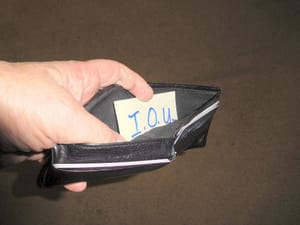So you’re considering quitting the rat race and becoming an entrepreneur — congratulations. Whether you’re working on a killer startup with a few pals or embarking on a career of self-employment, you’re about to discover what life is like when you have maximal control.
In many ways, it’s awesome. I’ve been self employed, running Tweney Media, for a bit more than a year. It’s not my first rodeo: I was a self-employed freelance writer for about 4 years from 1999–2003. Self-employment is way better now than it was the last time, mostly because of the internet, which gives me access to a kind of social interaction that was difficult to come by in the early 2000s. So, it’s less lonely. It’s also easier to network, find new business opportunities, work with people around the world, and to educate yourself.
Self-employment and early-stage entrepreneurship is also an excellent exercise in self-determination. You realize that everything you do has meaning. If you find yourself doing bullshit, you can just stop. Do something else that’s meaningful, or makes you money, or both. If you find yourself working with assholes, you can stop. Life’s too short. Find different partners or clients. If you have an idea for something amazing, you can do it. Why not? You’re an entrepreneur! This attitude leads me to new realizations about my life, the world, and how they intersect almost every day. I have never felt more awake.
But to be successful you’re going to need to know a few things about financing a life of entrepreneurship. I’m not going to give you the usual crap advice: “Skip the $3 lattes at Starbucks.” If you’re drinking so many lattes that it’s impacting your finances, you have a serious caffeine and foamed milk addiction and you may need medical help. No, the real issues facing you are much more serious: Health care, debt, taxes, and housing are all extremely expensive. Cash flow is a bitch. Doing accounting is necessary and hard. And, unfortunately, the U.S. economic system is not going to help you with any of those. In fact, you could say that the U.S. economy actively discourages entrepreneurship.
Here are some things you need to know if you’re considering becoming an entrepreneur.
Health care will f*** you.
Seriously, the U.S. health care system is a travesty. It is the opposite of a functioning free market: It’s a completely opaque market where you don’t know what you’re buying, you don’t know what it will cost until you get the bill, and you can’t compare options. This is as true for a band-aid in the hospital as it is for the insurance that supposedly covers it. And insurance costs more, and covers less, every year. The result: Everything is insanely expensive.
This is not just an Obamacare problem. This is far deeper than that. And even with employer-sponsored health insurance, you may already be spending tens of thousands of dollars on uncovered health expenses. If you’re self employed, it’s just that much starker.
As an example, my family of four in California spends $20,000 a year on insurance, and about as much again on uncovered health care costs. And we’re fairly healthy people. (So far.)
Credit cards will f*** you.
You’re not going to get VCs to back you at first unless you’ve already had a successful startup under your belt. Banks won’t loan you money unless your business has several years of records to show. Unfortunately for you, you’re going to need to fund your business out of your own pockets. Unless you’ve built up a big nest egg, that probably means credit card debt. Once you have it, credit card debt is very hard to get rid of.
Granted, if you have good credit, you can take advantage of low-interest-rate offers and turn credit card debt into very low percentage loans. Pay attention to when those offers come up and how long they last, and you can move the debt around as needed to keep the rates insanely low (for now). That’s a reasonable way to fund your business at first. But just remember, it’s still debt. You need to pay it back. And as long as you’re paying it off, that adds to your monthly overhead.
Housing costs will f*** you.
Especially if you want to live where the opportunities are, like Silicon Valley/San Francisco, or New York, or someplace else where there are creative people doing interesting things and investors fueling companies that might want to pay for your product or services. But housing costs are insane in these places. A 2-bedroom rental in SF or the East Bay goes for $4,000 a month these days. If you have a family, you’re going to be paying. A lot.
Taxes will f*** you.
I’m not talking about the tax rate, but about the process of paying taxes as a self-employed person. You will need to make quarterly estimated tax payments. That means every three months you need to estimate how much money you’re likely to make for the whole year, calculate approximately how much of that will be taxable, figure out what your estimated total tax will be for the year, and then based on that figure how much you ought to pay this quarter so your four quarterly payments wind up being pretty close to the correct total. And then write a check to the IRS. A big check.
Cash flow will f*** you.
In order to write that check to the IRS (and your monthly rent or mortgage check, and your medical bills, etc) you will need to pay close attention to your cash flow and ensure that you’re saving enough money from whatever you’ve got coming in so you make all those payments when they come due. If you don’t manage your cash flow intelligently, it’s entirely possible to go completely bust even while you are making great money. That’s because it always takes the money longer to come in than you expect it to, especially if you have a service business that involves invoicing people. (This is a strong argument for building a SaaS business where you get recurring monthly revenues without having to send invoices, btw.) Some months the incoming cash will be great. Some months it will be terrible, or zero. You need to plan things out to deal with those lumps. And that brings us to accounting.
Accounting will f*** you.
I would be lost in this whole process if it weren’t for my wife, who is also our CFO. She spends hours with spreadsheets figuring out the optimal tax strategy, the optimal health insurance choices (modeling different policies against what we actually use), figuring out our cash flow, and making sure bills get paid on time. It’s an enormous job that she spends many hours on every week. If you aren’t lucky enough to have a partner like this, you’re going to need to do it yourself, or pay an accountant.
Oh, and by the way? Mint is useless for most of this. There are no financial management systems out there that accommodate self employed people’s needs, such as budgeting for uneven cash flow. As far as I know, there’s no financial management system that can deal with the need to manage significant credit card debt either. If you are self-employed, your finances are more complex than most, and you need to do most of the work manually. Google Sheets is your friend. (Update: a friend tells me that You Need a Budget, aka YNAB, is designed for helping manage credit card debt.)
Accounting may be a pain, but you need to do it. The amount of expenses involved in being an entrepreneur — just to stay alive and keep a roof over your head — are not trivial. The complexity of managing those expenses is a pain. But there are significant opportunities for savings if you’re willing to dive in. Just remember that diving in will take a lot of time, or money, or both.
Like I said at the top, entrepreneurship is great. I’m happier than I ever have been in my career, and I’m building a growing business that is starting to generate work for other people too. I’m making more money (on a gross revenue basis) than I ever earned in a day job. I love the flexibility and the self-awareness. I am proud to be supporting my family.
But it is financially challenging. It takes a lot of determination to fight into the headwinds like this. If you’re considering going independent, you need to know what you’re getting into.



